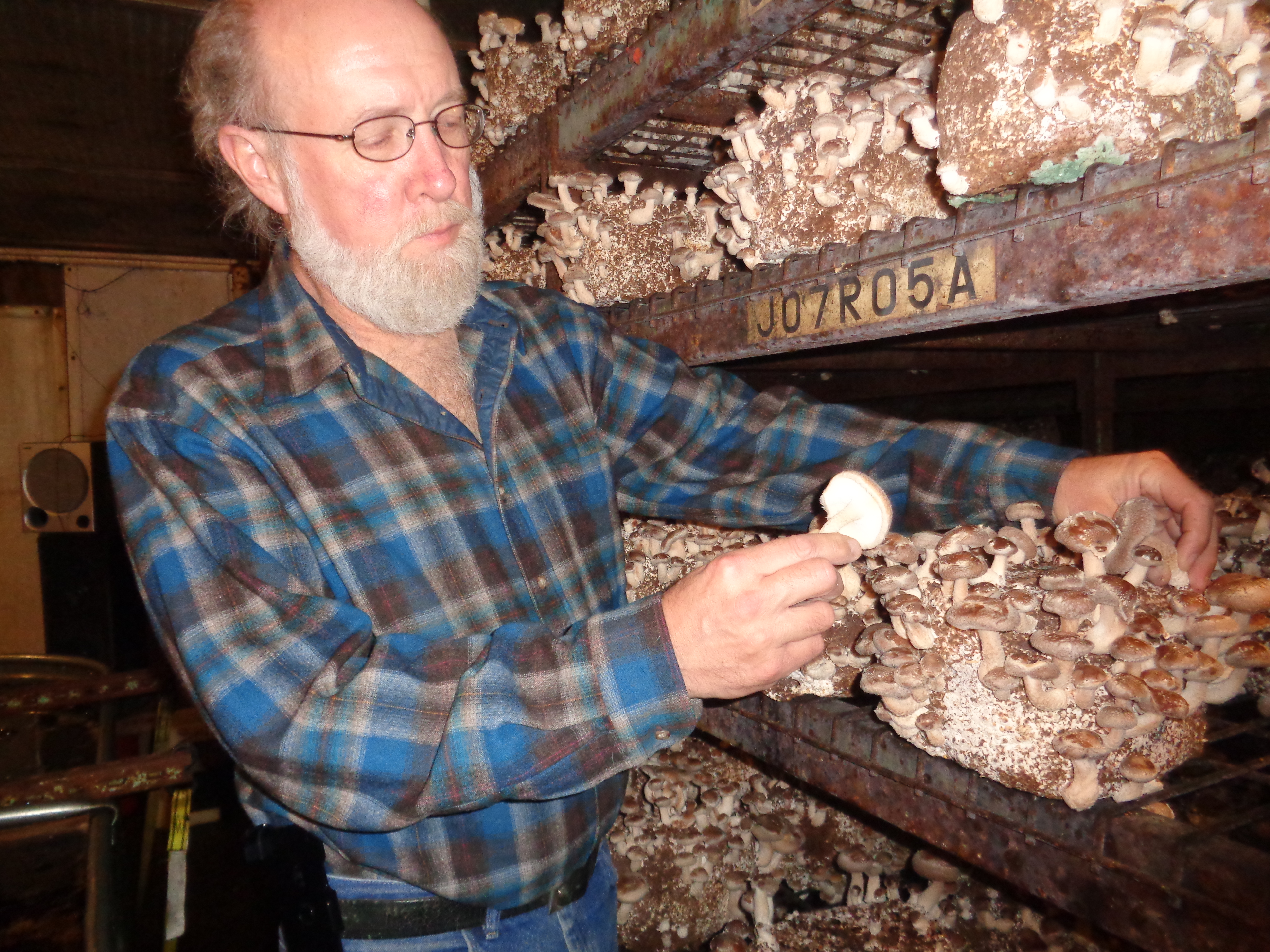by Mollie Rushmeyer
news@thenewsleaders.com
For an organism found in the most seemingly indiscriminate places in nature, one wouldn’t assume mushrooms to be particular when cultivated by human hands. But as Kevin Doyle can attest, mushroom-growing is indeed a delicate process and brings many health and environmental benefits with it.
Doyle is a St. Joseph mushroom farmer and Minnesota Department of Health-certified mushroom expert.
Doyle’s farm and mushroom distribution company, Forest Mushrooms Inc. near St. Joseph, has been around since 1985. Now three decades later, Doyle grows two kinds of exotic mushrooms, shiitake and oyster, and distributes more than 20 other varieties.
With a five-day growing period, Doyle said 2,500 pounds per week of oyster mushrooms are harvested at his farm and 600 pounds of shiitake, both year-round.
“There is no season,” Doyle said. “We’re out there every day picking.”
And to make these fungi grow, Doyle must keep the barns at a constant 62 degrees Fahrenheit. His air system provides a complete air exchange every five to 10 minutes in order to keep the carbon-dioxide level of the air at the necessary 700 parts per million. Even with this much fresh air coming in, the mushroom barn must remain at 93-percent constant humidity to keep them growing.
Visions of manure piles and mushrooms emerging from the ground may come to mind when thinking of mushroom farming. However, the process is much cleaner than one might suppose.
“We wash everything. Spray everything down every day,” Doyle said. “You could eat off this floor.”
The mushrooms themselves grow from blocks of either sawdust or straw. The shiitake grow from blocks of sterilized hardwood sawdust in one area, the oyster from bagged pasteurized straw, sprouting from holes made in the bag in another area of the barn. They are kept in the temperature-controlled barn, on shelves. Both leave behind the waste blocks that are then used by gardeners and farmers as nutrients for their soil and mulch, much like wood chips.
“There’s nothing to wash (on the mushrooms),” Doyle said. “You just pick them when they’re mature and they’re ready to cook and eat.”
And after so many years, Doyle has a natural ability and a keen eye for good mushrooms and how to keep them growing right. He said his interest in growing things and plant life started as a child.
“My parents wanted lots of children,” Doyle said. “But they didn’t have a lot of money, and we did not have a TV in our house. They (his parents) felt TV led to a generally slothful existence and wasn’t stimulating enough intellectually.”
So he and his siblings spent most waking hours either reading or exploring the outdoors, which sparked his love of botany and the natural world around him. He said he spent much time identifying flowers and plants as a child, as well as reading plant taxonomy books. When Doyle attended college at St. John’s University in Collegeville, he majored in natural sciences, emphasizing his course work in plant science.
After college and a stint working with fast-growing woody energy crops for the University of Minnesota, he began researching the relatively new idea of acquiring food and fuel from organic wastes. A two-year study on the topic led Doyle to one of the best natural and cultivated waste-growers – mushrooms. He started an operation out of a basement in Ham Lake to produce fungi for selling.
“We started small,” Doyle said. “Only sold to a few restaurants.”
Then an expanded operation became a dream come true when Doyle found the current location for Forest Mushrooms Inc., a 240-acre farm with an artisan well on-site in St. Joseph, in 1985.
He has since increased his market reach by not only selling the mushrooms he grows but also by distributing a large variety of fresh and dried wild mushrooms he buys from harvesters and sells to many wholesalers throughout the Midwest. People can even find his mushrooms in Lund’s and Byerly’s, Cashwise, Coborn’s, Whole Foods Markets and Cub Foods, as well as purchase dried mushrooms through their website and have them shipped to their homes.
“We’re a one-stop mushroom shop,” Doyle said.
The ever-changing market of organic products like his mushrooms keeps things interesting, Doyle said.
“There are no two days alike,” he said.
He said he’s proud of the product itself with its many health benefits, which are touted by some to include the ability to lower blood pressure, aid in losing weight, contain numerous vitamins and minerals, and – in addition to health benefits – are an environmentally conscious crop.
But two of his greatest joys as a business owner, Doyle said, have been the ability to donate back to organizations in the area and to provide for his employees. The company often donates unique mushroom gift baskets for charity auctions to the St. John’s Prep School, Habitat for Humanity and the St. Cloud School District, for example.
As for his employees, he said he enjoys giving people a decent job, with good benefits in uncertain times.
“It’s nice to provide for them,” Doyle said. “To give back to those that make it successful.”
All in all, Doyle said, the fungi life is a charmed life.

Kevin Doyle of St. Joseph, owner of Forest Mushrooms Inc., explains the intricacies of growing shiitake mushrooms from sawdust blocks in a temperature- and oxygen-controlled barn at his St. Joseph farm.

Since 1985, Forest Mushrooms Inc. owner and Minnesota Department of Health-certified mushroom expert Kevin Doyle grows mushrooms, like these oyster mushrooms, and distributes other wholesale exotic mushrooms around the United States.




